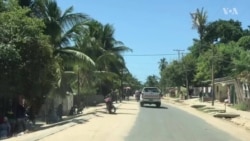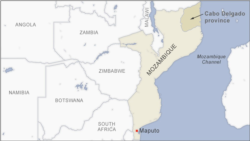For civilians in northern Mozambique facing attacks by Islamic militants, the port city of Pemba feels safe, but for aid groups operating in the restive region the coronavirus pandemic is posing major challenges.
Pemba is the provincial capital of Cabo Delgado, where attacks have forced thousands of civilians to flee their homes. Militants reportedly affiliated with the Islamic State (IS) terror group have been active since late 2017, with more than 11 of the 16 districts experiencing attacks, according to ReliefNet.
More than 1,000 people have been killed in militant attacks, according to U.N. reports. The number of displaced people has risen from around 1,000 in March 2019 to over 115,000 in March 2020, according to a ReliefNet report published in April.
A significant number of those fleeing have settled in Pemba.
Maria Rachide, a housewife, arrived in Pemba in April after militants invaded her town of Muidumbe, which is about 270 kilometers north of Pemba. She says she and her young children spent two days on the road before reaching safety in Pemba.
"I started walking through the jungle with the children, but shots were heard in a neighboring village. We got tired, so we spent the night in the bushes," she told VOA.
Catholic Caritas, a charity organization affiliated with the Catholic Church, has expressed concern about the growing number of displaced people in Pemba, especially during the COVID-19 pandemic.
"One major phenomenon we noticed during this time of social isolation is that households have multiplied in numbers," said Latifo Fonseca, a Catholic priest who has been involved in helping displaced people in Pemba since 2017.
"A small place now has than 20 people. This is not an ideal situation during the coronavirus [pandemic] and it worries us a lot," he told VOA.
Mozambique has reported 227 confirmed cases and one death as of May 28, according to Johns Hopkins University and the Africa Centers for Disease Control and Prevention.
Because of instability and restrictions on movement, humanitarian assistance from the World Food Program (WFP) in April reached only 39,500 people out of a total of 95,000 displaced people in Pemba and other districts of Cabo Delgado, local news said. WFP describes Mozambique as a "low-income, food-deficit country."
Last month, a large supply of aid was reportedly seized by the militants when they took control of a warehouse near the town of Quissanga, a three-to-four-hour drive from Pemba.
"Any food not delivered directly to the vulnerable populations is a loss for humanitarian support," said James Lattimer, deputy director of WFP in Mozambique. "But theft will not prevent WFP from continuing to provide food assistance to communities in need."
Lattimer told VOA that the U.N. is mobilizing resources to respond to the needs of displaced people amid COVID-19 and other diseases spreading in the African nation.
The displaced, however, don't want to remain dependent on aid indefinitely.
"The government will not be able to support all families here," said Martin Ninta, a 42-year-old college professor who left his town of Bilibiza for Pemba because of the violence.
"We have asked our government to take action to eliminate those [armed] men," he told VOA, because people want stability so they can return to their villages.







